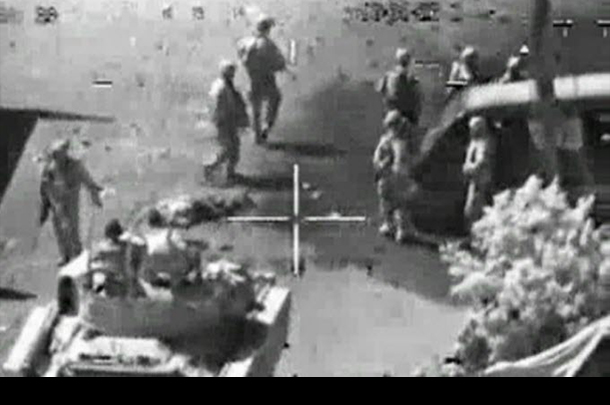Author Ann Wright is a 29-year veteran who retired as a U.S. Army Reserve colonel and who later served as a U.S. diplomat in nine countries and deputy ambassador in four U.S. embassies. She is a member of the Advisory Board for the Bradley Manning Support Network.

Ann Wright
Stars & Stripes
Former Defense Secretary Robert Gates was right when he suggested that the WikiLeaks revelations were “embarrassing” and “awkward.” But his assessment — and that of so many other government officials — stems from the magnitude of what he left unsaid.
These revelations are not merely embarrassing. They also contain evidence of government actions and policies that are an abuse of power and that violate international human-rights standards to which we as Americans are committed.
For instance, through the information coming from WikiLeaks documents, the public is now aware of “FRAGO 242” — an official order not to report evidence of prisoner abuse by Iraqi security forces. This policy violates the United Nations Convention Against Torture, which was ratified by Congress in 1994. The treaty explicitly requires allegations of cruel or inhuman treatment to be investigated and brought to a halt.
In recent days, WikiLeaks has released cables that show government officials helped conceal the heinous execution of family members of suspected combatants in Iraq. The site of the murders, which included the execution-style slaying of two children and three infants, was obliterated by a subsequent coalition airstrike.
Taken as a whole, the material shows a pattern of concealing abuse by both U.S. and coalition forces. The information revealed by WikiLeaks is thus a critically important tool for those who seek to uphold basic human-rights standards and the professional conduct of U.S. military forces.
These revelations also bring our system of classification into question. Although Pfc. Bradley Manning has not yet been brought to trial, President Barack Obama has publicly declared that the former U.S. Army intelligence analyst “broke the law” by allegedly sending this restricted information to WikiLeaks.
Many civilians — and a surprising number of military personnel — are unaware that this system of classification is not grounded in any law passed by Congress. In fact, the entire edifice that allows the use of classification rests solely on the basis of executive orders that have been renewed and modified by various presidents. The ability to restrict information from the public is essentially an unchecked assertion of executive power.
However, according to Obama’s policy for classification of government documents (Executive Order 13526), there are several situations under which government information must never be classified. The government cannot use classification procedures “to conceal violations of law, inefficiency, or administrative error; prevent embarrassment to a person, organization, or agency … or prevent or delay the release of information that does not require protection in the interest of the national security.”
Administration officials have not provided any evidence that these WikiLeaks revelations have harmed our national security. They have, however, acknowledged that some of the material is personally, and professionally, embarrassing.
But they continue to act as if evidence of illegal or otherwise unethical behavior simply does not exist.
If online conversations attributed to Manning are accurate, it appears that his self-described “turning point” came when his own commanding officer refused to acknowledge clear evidence of an abuse of power. According to these conversations, Manning says he was told to investigate 15 Iraqi academics who had been brought in for questioning by Iraqi security forces, for the crime of supposedly printing “anti-Iraqi literature.”
After running the printed material through a translator, Manning realized that it was actually an article titled “Where Did the Money Go?” which sought to expose corruption within Prime Minister Nouri al-Maliki’s Cabinet. Manning’s commanding officer is said to have told Manning to “shut up” and find out how he could bring in more detainees. The message was clear: He could not rely on the chain of command to address evidence of wrongdoing.
This incident would be consistent with other revelations that have since emerged from the WikiLeaks embassy cables. Several diplomatic cables express concern about al-Maliki’s politicization of his security forces, using them to abuse political opponents.
In July, the Red Cross and a group of Iraqi parliamentarians asked for an investigation into an alleged torture facility being run by one of al-Maliki’s elite units in Baghdad’s Green Zone. That same month, the Special Inspector General for Iraqi Reconstruction issued a report that noted more than $17 billion in funds that have gone missing.
The pattern of ignoring or otherwise concealing clear evidence of abuse has become so familiar that, to many, it now seems normal. But pretending that problems don’t exist won’t make them go away.
A recent report from the Council of Europe, which convenes the European Commission on Human Rights, stated that the current “deficit of transparency” among Western security and intelligence institutions leaves no choice but for the public to rely on whistle-blowers to hold governments accountable.
Instead of punishing and silencing alleged whistle-blowers like Manning for revealing uncomfortable truths, we should honor their courage to stand up for what’s right.
That’s all we should ask any American to do.
***
READ MORE ASSANGE NEWS AT: 21st Century Wire Assange/Wikileaks Files
SUPPORT OUR MEDIA PLATFORM – BECOME A MEMBER @21WIRE.TV















